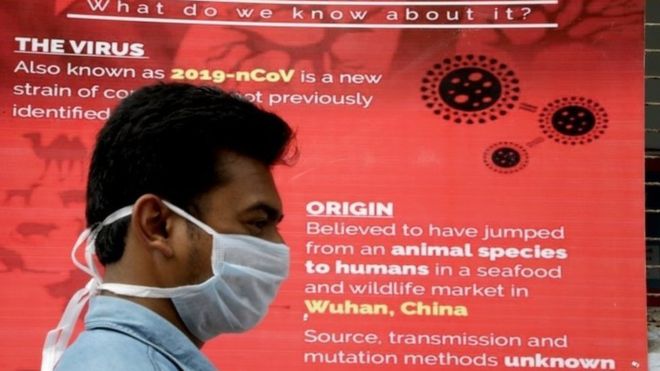India has recorded its first death linked to the coronavirus, officials confirmed.
The 76-year-old man, from the southern state of Karnataka, returned from Saudi Arabia on 29 February after a month-long visit.
People who came in contact with the man, who died on Tuesday, are being traced and quarantined, the state's health minister said.
India has 73 confirmed cases of the virus, the health ministry says.
The dead man's test results were only made public on Thursday.
Officials say he was screened at the airport when he arrived from Saudi Arabia but showed no symptoms at the time.
After he developed difficulties last week, he was taken to hospital.
India has taken a number of steps to halt the spread of Covid-19:
- All visas, barring a select few categories, have been suspended for a month
- Visa-free travel afforded to overseas citizens of the country has been suspended until 15 April and even those allowed in could be subject to 14 days of quarantine
- Schools, colleges and movie theatres in the capital, Delhi, have been shut until 31 March
- The fate of the 13th edition of the Indian Premier League (IPL), featuring nearly 60 foreign players and scheduled to begin on 29 March, will be decided on Saturday
- Two one-day cricket matches between India and South Africa will be played behind closed doors
India's health ministry says it was among the first countries in the world to prepare for an outbreak of the respiratory illness, and denied allegations that it was slow in testing suspected cases.
"Our surveillance system is strong and we are able to quickly identify any symptomatic patients," RR Gangakhedkar from the Indian Council of Medical Research (ICMR) told reporters on Thursday.
However, there are concerns about whether the country will be fully equipped to prevent and treat an outbreak.
It would be near impossible for India to force its citizens into mass quarantine and hospitalise people in numbers like China, says the BBC's Soutik Biswas.
Our correspondent says there are also concerns about the country's scanty healthcare data. India has a shoddy record in even recording deaths and disease - only 77% of deaths are registered, and doctors are more likely to get the cause of death wrong than right, according to a study the Toronto-based Centre for Global Research. There is patchy data for flu-related deaths.
Rumours, myths and misconceptions spread through social media could also hurt an effective response to the infection.
Latest Stories
-
Over 3,600 people from 80 countries gather for Bishop Dag Heward-Mills’ Homecoming Conference
20 mins -
Ghana’s death by galamsey: Who will bell the cat?
29 mins -
Oheneba Adusei Poku
30 mins -
Outgoing Effia MP Joseph Cudjoe supports NPP campaign to retain seat
38 mins -
Enimil Ashon: 2016/2020 promises; Gabby vrs McDan
41 mins -
Education Ministry complicit in expired rice distribution to SHS – Ablakwa
60 mins -
100 years after exile: Seychelles honours Asantehene Prempeh I
1 hour -
UK announces £74m clean cooking initiative, including support for Ghana
1 hour -
Wese Obiabaka awarded honorary senior membership by CIBN
1 hour -
David Ako
2 hours -
Petroleum Commission to reduce Ghana’s 15% participating interest in oil explorations
2 hours -
Florence Toffa: A woman whose contribution is helping shape Ghana’s digital landscape
3 hours -
Bawku conflict: 3 more dead as death toll rises to 26
3 hours -
Okyeame Kwame projects ‘kente’ at Earthshot Prize event in South Africa
3 hours -
Two siblings aged 12 and 9 join anti-galamsey crusade with a sonnet
3 hours

